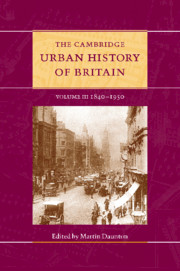Book contents
- Frontmatter
- 1 Introduction
- Part I Circulation
- Part II Governance
- 9 Central goverment and the towns
- 10 The changing functions of urban government: councillors, officials and pressure groups
- 11 The political economy of urban utilities
- 12 The provision of social services
- 13 Structure, culture and society in British towns
- Part III Construction
- Part IV Getting and spending
- Part V Images
- Select bibliography
- Index
- Plates 1-7
- Plates 8-14
- Plates 15-20
- Plates 21-27
- Plates 28-34
- Plates 35-41
- Plates 42-48>
- Plates 49-53
- References
9 - Central goverment and the towns
from Part II - Governance
Published online by Cambridge University Press: 28 March 2008
- Frontmatter
- 1 Introduction
- Part I Circulation
- Part II Governance
- 9 Central goverment and the towns
- 10 The changing functions of urban government: councillors, officials and pressure groups
- 11 The political economy of urban utilities
- 12 The provision of social services
- 13 Structure, culture and society in British towns
- Part III Construction
- Part IV Getting and spending
- Part V Images
- Select bibliography
- Index
- Plates 1-7
- Plates 8-14
- Plates 15-20
- Plates 21-27
- Plates 28-34
- Plates 35-41
- Plates 42-48>
- Plates 49-53
- References
Summary
THE MUNICIPAL CITY
In 1890 Sidney Webb offered an imaginary but by no means fanciful parable of urban life. He described the movements of ‘the Individualist Town Councillor’ who
will walk along the municipal pavement, lit by municipal gas and cleansed by municipal brooms with municipal water, and seeing by the municipal clock in the municipal market that he is too early to meet his children coming from the municipal school hard by the country lunatic asylum and municipal hospital, will use the national telegraph system to tell them not to walk through the municipal park but to come by the municipal tramway, to meet him in the municipal reading room, by the municipal art gallery, museum and library, where he intends to consult some of the national publications in order to prepare his next speech in the municipal town-hall, in favour of the nationalization of the canals and the increase of the government control over the railway system. ‘Socialism, sir,’ he will say, ‘don’t waste the time of a practical man by your fantastic absurdities. Self-help, sir, individual self-help, that’s what’s made our city what it is.
A century later water and gas would be in private hands, the hospital would be managed by an unaccountable trust and the school might have opted out of local authority control. Progress would have seen off the trams, but the buses that replaced them would have been privatised and deregulated. The municipal brooms would have been put out to tender and the surviving local authority services would probably be strictly cash-limited.
Keywords
- Type
- Chapter
- Information
- The Cambridge Urban History of Britain , pp. 259 - 286Publisher: Cambridge University PressPrint publication year: 2001
References
- 2
- Cited by

